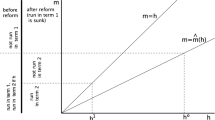Abstract
This paper challenges the assumption inherent in most models of legislative behavior — namely that congressmen are driven by the desire for reelection. I offer an alternative perspective: incumbents seek to maximize their discretionary investments and the income generated by the job. The only constraint on this behavior is that legislators provide a satisfactory level of constituency service — a product that I suggest entails slight opportunity, and few manufacturing, costs for congressmen, and one that is unlikely to lose its value with increased production. I also demonstrate that increases in salary and discretionary investments have lengthened congressional careers.
Similar content being viewed by others
References
Davidson, R. (1969). The role of the congressman. New York: Pegasus.
Downs, A. (1957). An economic theory of democracy. New York: Harper and Row.
Erikson, R.S. (1972). Malapportionment, gerrymandering, and party fortunes in congressional elections. American Political Science Review 66 (December): 1234–1245.
Fenno, R.F. (1978). Home style. Boston: Little, Brown.
Ferejohn, J.A. and Calvert, R.L. (1984). Presidential coattails in historical perspective. American Journal of Political Science 28 (February): 127–146.
Fiorina, M.P. (1977). Congress: Keystone of the Washington establishment. New Haven, CT: Yale University Press.
Garand, J.C. and Gross, D.A. (1984). Changes in the vote margins for congressional candidates: A specification of historical trends. American Political Science Review 78 (March): 17–30.
Gwartney, J.D. and Stroup, R. (1983). Economics: Private and public choice. Orlando, FL: Harcourt, Brace, Jovanovich, 3rd edition.
Johannes, J.R. (1980). The distribution of casework in the U.S. Congress: An uneven burden. Legislative Studies Quarterly 5 (November): 517–544.
Kau, J.B. and Rubin, P.H. (1979). Self-interest, ideology, and logrolling in congressional voting. Journal of Law and Economics 21 (October): 365–384.
Loomis, B.A. (1984). Congressional careers and party leadership in the contemporary House of Representatives. American Journal of Political Science 28 (February): 180–202.
Marris, R. (1964). The economic theory of "managerial" capitalism. New York: Free Press.
McChesney, F.S. (1987). Rent extraction and rent creation in the economic theory of regulation. Journal of Legal Studies 16 (January): 101–118.
McCormick, R.E. and Tollison, R.D. (1981). Politicians, legislation, and the economy. Boston: Martinus Nijhoff.
Mayhew, D.R. (1974a). Congress: The electoral connection. New Haven, CT: Yale University Press.
Mayhew, D.R. (1974b). Congressional elections: The case of the vanishing marginals. Polity 6 (Spring): 295–317.
Niskanen, W.A. (1971). Bureaucracy and representative government. Chicago: Aldine-Atherton.
Niskanen, W.A. (1975). Bureaucrats and politicians. Journal of Law and Economics 18 (December): 617–644.
Ornstein, N.J. (1975). Causes and consequences of congressional change: Subcommittee reforms in the House of Representatives, 1970–73. In N.J. Ornstein (Ed.), Congress in change, 88–114. New York: Praeger.
Parker, G.R. (1986). Homeward bound: Explaining changes in congressional behavior. Pittsburgh: University of Pittsburgh Press.
Parker, G.R. (1989). Characteristics of Congress: Patterns in congressional behavior. Englewood Cliffs, NJ: Prentice Hall.
Parker, G.R. and Davidson, R.H. (1979). Why do Americans love their congressmen so much more than their Congress? Legislative Studies Quarterly 4 (February): 52–61.
Peltzman, S. (1976). Toward a more general theory of regulation. Journal of Law and Economics 19 (August): 211–240.
Peltzman, S. (1984). Constituent interest and congressional voting. Journal of Law and Economics 27 (April): 181–210.
Peltzman, S. (1985). An economic interpretation of the history of congressional voting in the twentieth century. American Economic Review 75 (September): 656–675.
Polsby, N.W. (1968). The institutionalization of the U.S. House of Representatives. American Political Science Review 62 (March): 144–168.
Price, H.D. (1975). Congress and the evolution of legislative "professionalism". In N.J. Ornstein (Ed.), Congress in change, 2–23. New York: Praeger.
Shugart, W.F. and Tollison, R.D. (1985). The cyclical character of regulatory activity. Public Choice 45: 303–313.
Stigler, G.J. (1971). The theory of economic regulation. Bell Journal of Economics (Spring): 3–21.
Tufte, E.R. (1973). The relationship between seats and votes in two-party systems. American Political Science Review 67 (June): 540–554.
Weingast, B.R. and Marshall, W.J. (1988). The industrial organization of Congress; or, why legislatures, like firms, are not organized as markets. Journal of Political Economy 96: 132–163.
Westefield, L.P. (1974). Majority party leadership and the committee system in the House of Representatives. American Political Science Review 68 (December): 1593–1604.
Author information
Authors and Affiliations
Additional information
I would like to acknowledge the advice and comments of Morris Fiorina, Kenneth Shepsle, James Gwartney, and Randy Holcombe. None of these scholars, however, bear any responsibility for the interpretations presented in this paper.
Rights and permissions
About this article
Cite this article
Parker, G.R. Looking beyond reelection: Revising assumptions about the factors motivating congressional behavior. Public Choice 63, 237–252 (1989). https://doi.org/10.1007/BF00138164
Issue Date:
DOI: https://doi.org/10.1007/BF00138164




